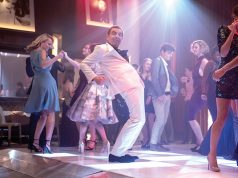“The Good Shepherd” is solid, respectable filmmaking, egregiously overlong (a plague this time of year, it seems) but still highly watchable. It’s moody and complicated and tricky, a real movie for grown-ups, as they say.
It was directed by Robert De Niro, marking only his second time behind the camera (the first was 1993’s “A Bronx Tale”) and representing real maturity on his part. De Niro has acted for some of the best filmmakers in Hollywood, and it’s nice to see he’s learned from them. “The Good Shepherd” may wear out its welcome before it’s over, but it has atmosphere and subtext in spades.
It begins with the Bay of Pigs fiasco in 1961 before jumping back to 1939 and working its way forward. In the ’60s, our protagonist, Edward Wilson (Matt Damon), is a quiet, bespectacled CIA agent who is distressed to learn that when the U.S. landed at Cuba, the Soviets already knew their position: Someone within the CIA must have leaked the information.
Flashback 22 years. Edward is a student at Yale, adept at poetry, an occasional stage actor, sensitive and personable. He is newly accepted into the secretive Skull & Bones society and is thus familiar with covert groups and whispered plans. An FBI agent named Murach (Alec Baldwin) recruits him to spy on a professor believed to be a Nazi sympathizer, and thus begins Edward’s life-long association with information-gathering.
We follow him through World War II, where he works for the OSS (Office of Strategic Services), and afterward, when the OSS morphs into the CIA. The film, penned by prestigious non-fiction screenwriter Eric Roth (“Munich,” “Ali,” “The Insider”), is as much an examination of the CIA’s roots as it is a study of Edward’s character: a man with a life full of secrets and a devotion to his work.
Filling your life with secrets and being devoted to the government above all else means you have to tell a lot of lies, too, which Edward is good at without ever being used to it. He has a son (Eddie Redmayne) from his loveless marriage to a fellow blue-blood (Angelina Jolie), and his relationships with both of them are understandably strained. Edward has been doing his duty his entire life and has never had a chance to be himself. By now, he IS the CIA.
De Niro appears onscreen in a small role, as does his buddy Joe Pesci (the latter’s first film appearance in eight years). Billy Crudup, John Turturro, Michael Gambon, and William Hurt are here, too, all working seriously and on the film’s cloak-and-dagger “trust no one” mantra.
It’s one of Matt Damon’s more tamped-down roles, although it does fit with the brooding, enigmatic characters he’s been playing lately. Edward is confounded by the contradictory duties of job and family, and Damon displays the character’s psychological scars perfectly.
Despite the film’s occasionally too-complicated plot and rambly running time, I’m inclined to treat it charitably simply because of its class and intelligence. Its goal is to subtly draw parallels between the U.S. government then and the U.S. government now, to show us history in the hopes that we’ll learn from it — or, at the very least, be stirred to some thought about it.
B (2 hrs., 47 min.; )





